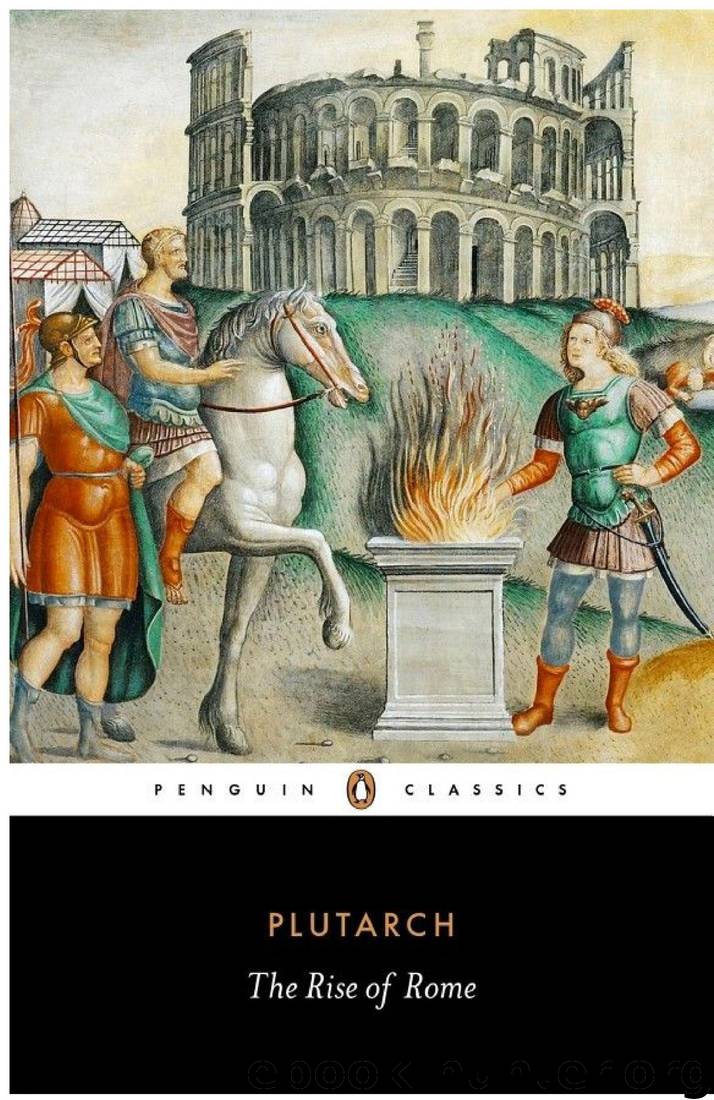The Rise of Rome by Plutarch

Author:Plutarch
Language: eng
Format: epub
Tags: History, Ancient, Rome, General, Europe, Biography & Autobiography, Historical, Literary Collections, Ancient & Classical
Publisher: Penguin UK
Published: 2017-07-25T05:10:25+00:00
When this response was reported, all the Achaeans rejoiced, especially the Sicyonians, who, changing at once from grief to festivity, donned garlands and white garments in order to bring the body of Aratus from Aegium into their city amid paeans and choruses. They chose a commanding site and buried him there, hailing him as the founder and saviour of their city. Even today this place is called the Arateium and there they offer him sacrifices.267 One is performed on the day when he freed the city from tyranny, which is the fifth day of the month Daesius, which the Athenians call Anthesterion.268 They call this sacrifice the Soteria.269 The other one takes place on the anniversary of his birth. The first of these sacrifices is performed by the priest of Zeus the Saviour, the second by the priest of Aratus, who wears a headband which is not entirely white but white and purple. Hymns are sung to the accompaniment of the lyre by members of the Artists of Dionysus.270 The gymnasiarch271 also takes part in the procession, leading the boys and young men of military age, and he is followed by the city’s council and all other citizens who wish to take part. These sacred rites, performed on their prescribed days, are still observed, but only a few traces of the ancient ceremonies remain. Most of these honours have lapsed, owing to the passage of time and changing circumstances.
54. Such, according to historians, was the life and character of the senior Aratus. As for his son, he was robbed of his reason by Philip, who was by nature an abominable man, marked by insolence and cruelty alike. He gave him poisons that, although they did not kill him, nonetheless left him crazed. Indeed, Philip reduced him to a creature possessed of frantic desires – at once frightening and strange – for bizarre adventures and for experiences that were both shameful and destructive. Consequently, his death, although it came when he was still a young man and in the full bloom of life, was not a misfortune but rather a deliverance from evil, and his salvation.
For his unholy crime, however, Philip never ceased, so long as he lived, paying just penalties to Zeus, protector of hospitality and friendship. For when he was vanquished in war by the Romans and submitted himself to their dominion, he was deprived of most of his empire, surrendered all his navy except five ships, promised to pay an indemnity of 1,000 talents and sent his son to Rome as a hostage.272 Owing only to the Romans’ pity did he keep Macedon and its tributaries. He was continually executing the noblest of his subjects as well as his closest kinsmen, as a result of which his entire kingdom feared and hated him. Amid so many evils, he enjoyed only one spot of good fortune, a son273 who excelled in virtue. But he killed him too, out of envy and jealousy of the honour paid him by the Romans.
Download
This site does not store any files on its server. We only index and link to content provided by other sites. Please contact the content providers to delete copyright contents if any and email us, we'll remove relevant links or contents immediately.
| France | Germany |
| Great Britain | Greece |
| Italy | Rome |
| Russia | Spain & Portugal |
Fanny Burney by Claire Harman(25784)
Empire of the Sikhs by Patwant Singh(22173)
Out of India by Michael Foss(16312)
Leonardo da Vinci by Walter Isaacson(11903)
Small Great Things by Jodi Picoult(6095)
The Six Wives Of Henry VIII (WOMEN IN HISTORY) by Fraser Antonia(4791)
The Wind in My Hair by Masih Alinejad(4424)
The Lonely City by Olivia Laing(4120)
The Crown by Robert Lacey(4105)
A Higher Loyalty: Truth, Lies, and Leadership by James Comey(4033)
The Iron Duke by The Iron Duke(3639)
Millionaire: The Philanderer, Gambler, and Duelist Who Invented Modern Finance by Janet Gleeson(3569)
Sticky Fingers by Joe Hagan(3454)
Alive: The Story of the Andes Survivors by Piers Paul Read(3312)
Papillon (English) by Henri Charrière(3270)
Joan of Arc by Mary Gordon(3259)
Stalin by Stephen Kotkin(3086)
Aleister Crowley: The Biography by Tobias Churton(3021)
Ants Among Elephants by Sujatha Gidla(2925)
